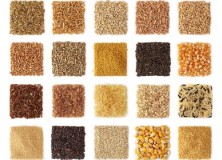Whole grains have been given a bad rap in recent years because of the whole gluten-free craze. Don’t get me wrong, I am fully aware of some people’s needs to eat gluten-free and I’m happy to see this craze leading to a bunch of new options for people. The reason I refer to it as a craze though, is that unless you have been diagnosed with celiac disease or some other medical issue that requires you to avoid gluten; whole grains are actually an extremely important part of a healthy diet!
I came across a recent news release that discusses whole grains and their health benefits. It reminded me of just how many people have been avoiding grains like the plague and could be depriving themselves of a very crucial part of their diet.
What Are Whole Grains Anyway?
Let’s start from the beginning. All grains begin as whole grains in which the seed is composed of three edible parts: the bran (outer skin), the germ (embryo) and the endosperm (germ’s food supply). These three parts are what make whole grains a healthier choice since fibre and many key nutrients are lost during the grain refining process.
You’ve probably eaten whole grains without even knowing it – such as while you’re chowing down on your morning oatmeal or munching on popcorn while watching a movie. Examples of whole grains include quinoa, barley, oats, flax, corn, rice and wheat (be sure to check the label for whole grain status, as any species of grain can be refined).
What Are the Benefits?
Whole grains aren’t the enemy unless a medical condition (confirmed through medical diagnosis) makes them so. Whole grains offer antioxidants and phytochemicals known to help fight diseases, and contain key nutrients such as B vitamins, magnesium, fiber and iron. So, if you’re trying to achieve a healthier diet, consider replacing your white and refined grains for whole grains.
The mentioned study concluded that consuming more whole grains was linked to lower overall mortality (up to 9%) and also cardiovascular disease-related mortality (up to 15%). Furthermore, the study found that replacing refined grains with whole grains is likely to reduce mortality – you can begin to incorporate this into your daily diet one serving at a time.
Regarding iron deficiency – since this is a blog about iron deficiency after all – I can’t help but mention that oatmeal (one of my favourite whole grain breakfast foods) is a good source of dietary iron.
So don’t ixnay grains from your plate just yet… keep in mind that they can play an important role in maintaining a healthy diet (for those who can tolerate them, of course) and consider replacing your white or refined grains for some whole grains!
Content and advice provided on The Iron Maiden is for information purposes only and should not serve as a substitute for a licensed health care provider, who is knowledgeable about an individual’s unique health care needs



I start every morning with some cooked steel cut oats, vanilla protein powder and wild blueberries. On the hot days some frig oatmeal with Chia seeds and banana or blueberries. Very filling, holds you over until lunch. I think it is better to get the complex carbs in early in the day,
Hi Debra – thanks for sharing! Sounds healthy AND delicious!
Leona